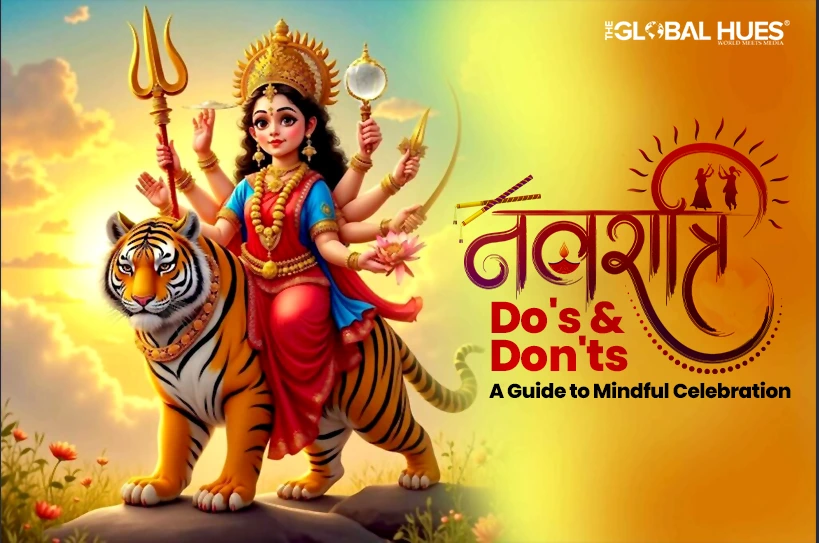Navratri is one of India’s most vibrant and significant festivals; that is celebrated enthusiastically. It spans nine days, during which devotees worship different forms of Goddess Durga, observe fasting, perform rituals and participate in festive dances like Garba and Dandiya. To fully honour the true spirit of the festival, it is important to follow certain do’s and don’ts that help uphold its sacred traditions and values.
During Navratri, people often change their eating habits. Some follow a Sattvic or vegan diet, avoiding non-vegetarian food such as onions and garlic. Others fast every day for nine days, only eating after offering prayers to the Goddess.
This article delves into the essential do’s and don’ts to observe during this auspicious period, ensuring a meaningful and mindful celebration.
Do’s & Don’ts During Navratri
Do’s During Navratri
- Fast With A Purpose In Mind
If you keep a fast during Navratri, you should do it with positive intention and mindfulness. Focus on consuming light foods like fruits, nuts and dairy products to keep your energy levels steady. Drinking plenty of water is also essential to stay hydrated. Furthermore, fasting helps you cleanse your body and allows you to focus more on spiritual practices and prayers.
- Pray Daily
During these nine days take some time out, from your busy schedule to worship Goddess Durga through prayers and rituals. It includes lighting a diya, offering fresh flowers and reciting specific mantras to honour her. Praying regularly to the Goddess helps you feel closer to her and creates a sense of peace and devotion within your heart.
- Meditate
Every day take some time to meditate and relax your body & spirit. Look for a quiet place, to sit comfortably and focus on your breathing or chant a special mantra, word, or phrase. Meditation helps you connect with yourself, lowers stress, and improves your awareness of your spiritual side. During Navratri, meditation can strengthen your connection to the festival’s energy and help clear your mind.
- Wear Clean & Comfortable Clothes
Wearing clean, traditional clothes during Navratri is a way to show respect for the festival and its traditions. You can pick comfortable outfits as you might participate in long rituals, dancing or fasting. Furthermore, wearing the colours associated with each day can help you feel more connected to the celebrations.
- Give Back
Navratri is an auspicious time to help those in need by being kind. You can donate food, clothes or money to less fortunate people. When you aid others, it makes a difference in their lives and gives you a sense of satisfaction and joy.
Don’ts During Navratri
- Don’t Sleep On The Bed
During Navratri, you should sleep on the floor instead of a bed and this practice is believed to show humility and respect for the festival. Furthermore, sleeping on the floor keeps us grounded and connected to Mother Earth. It also strengthens our bones and reduces back pain.
- Don’t Indulge In Violence
Navratri is an auspicious time when many believe that gods and goddesses visit our homes. During this time, keep the atmosphere in your peaceful and harmonious. Do not indulge in arguments or conflicts, to create a positive environment that allows the Divine to bless us with happiness, good health and fortune.
- Don’t Eat Non-Vegetarian Food
During Navratri avoid eating non-vegetarian food as it is considered disrespectful because it involves harming living beings. Instead, follow a Satvic diet that consists of light foods that help detox the body and improve digestion.
- Don’t Shave, Cut Hair & Nails
Many people avoid shaving or cutting their hair and nails during Navratri. It is done to focus more on spiritual practices rather than worrying about how they look. Also, since Navratri falls at the end of the rainy season, any cuts from shaving might take longer to heal because of the moisture.
- Don’t Eat Before Giving To Charity
During Navratri, one should only eat after performing the special ritual known as Kanya Pujan, where nine young girls are invited into homes and given food and gifts. By putting charity first, devotees honour the festival’s spirit of kindness and generosity, making their own meals feel even more meaningful.
The Bottom Line
Navratri, one of India’s most cherished festivals, is celebrated with great devotion and enthusiasm. Spanning nine days, it involves fasting, rituals, and worshipping Goddess Durga. This guide highlights the essential do’s and don’ts to follow during Navratri, ensuring a meaningful and spiritually enriching celebration.




